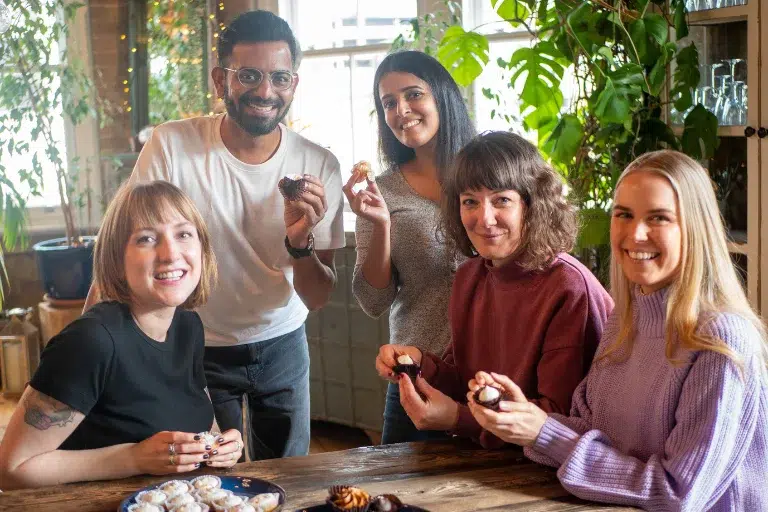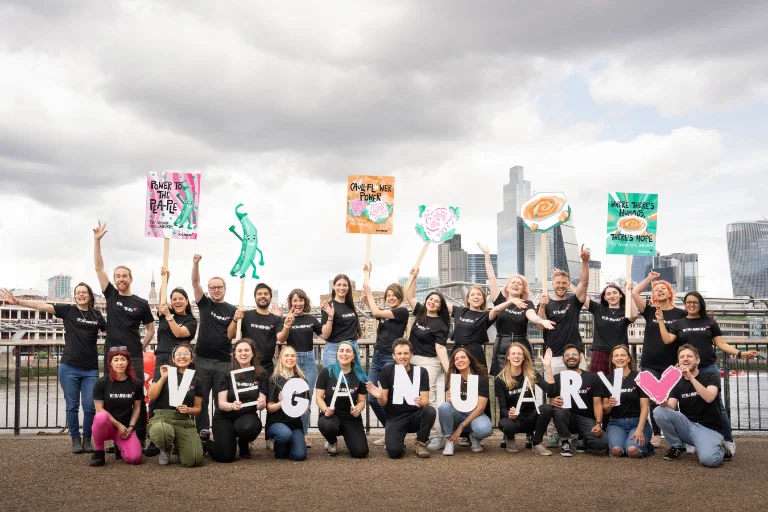
Partner Spotlight | World Health Day with Veganuary
Prashanth Vishwanath
Country Director, India | Veganuary
Interviewed By : Nidhi Gupta
Nidhi: Before we begin, let’s go back and recall that moment, or a memory when you understood that animals deserve kindness and respect, that they feel pain. I believe that moment is a crucial part of your journey today.
Prashanth: To be honest, there was no one moment like that for me. However, one dear experience that brought me closer to animals was the time I spent on my grandfather’s farm. I used to visit the place during our school vacations, and spent all day feeding chickens, playing with bunnies and taking the cows and buffaloes for a walk. Despite this, as is the case for many Indians, I was desensitised to believe that these animals were meant for our consumption. Later, when I was formally trained as an ecologist and worked on wildlife SOS conservation, I saw the same kind of difference in attitude towards wild animals and farmed animals: one kind is special and the other is not. I started the process of freeing myself from this conditioning and recognising that all animals deserve a life free of suffering and pain.
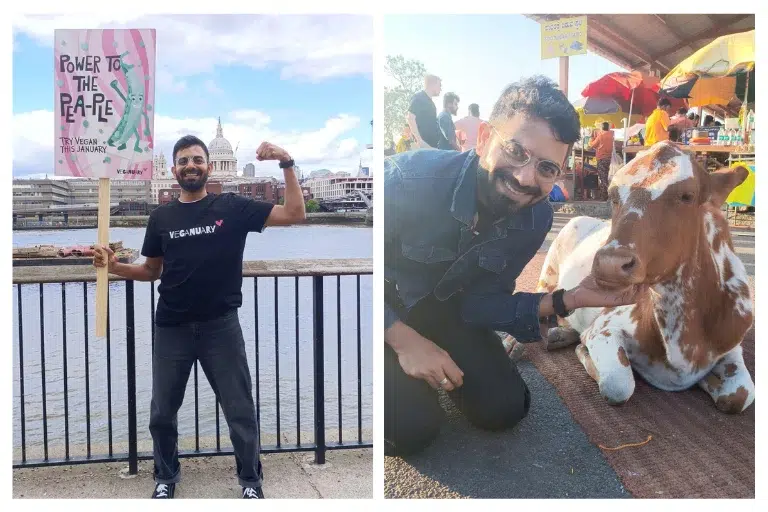
The campaigns I ran to rescue and rehab animals in circuses; for better care for street animals; and for better treatment of animals in dairy farms all brought back my childhood love for them. I could see that they are thinking, feeling and caring beings. The process has helped strengthen my conviction to help make a societal shift towards treating all animals with respect. I know it is difficult, as it was for me. That’s why I now focus my energy where there’s the most impact- to help people to leave animals off their plates. Billions of animals will be spared a life of suffering when people choose to eat plant based. My role as Director at Veganuary in India is to help create that ecosystem where it is easier for people to try vegan. By working with the media, celebrities, influencers and the corporate world, we make eating vegan fun, easy and accessible.
Nidhi: That is lovely! Many of us know that Veganuary has been instrumental in busting myths surrounding veganism. Can you elaborate on the strategies your organisation employs for this purpose? Where can individuals find reliable information if they want to start their vegan journey?
Prashanth: When you’re working on changing behaviours, you can’t be confrontational. You can’t argue with people and put them down. Everybody has their own journey, and you have to meet people where they are. We, at Veganuary, never judge people or shame them for any opinion they might hold about eating plant-based. I’d like to believe that our myth-busting has been an offshoot of providing people with reliable, honest and relatable advice on transitioning to a vegan diet. For example, is vitamin B12 low in a vegan diet? Yes. Should you panic and not give it a shot just for that reason? Absolutely not, as it is super easy to ensure adequate B12 intake with a little planning.
We are very clear that we are not a research group or a medical institution. Therefore, we make sure to rely on the best studies and advice from professionals on nutrition, health and environmental impact. Our job is to package them into a fun, informative and transformational journey, over 31 days, at the end of which people are empowered to make a lasting and sustainable change to the way they eat.
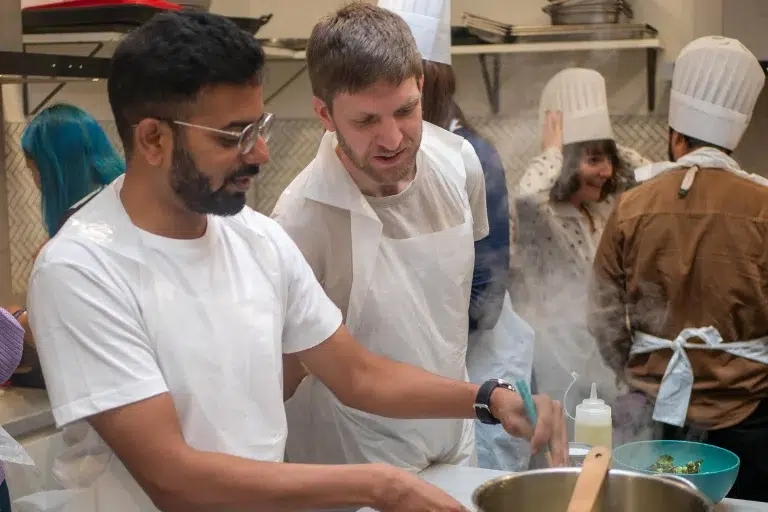
The Veganuary 31-day pledge is really a one stop solution for anyone to start their vegan journey, and all the world class resources we have put together are available for free! These include a ton of recipes, meal plans for every need (low calorie, sports nutrition, gluten free, you name it), cookbooks, a YouTube and podcast series and much more. You can check out our blog section for the most common questions asked about eating vegan: Is a vegan diet expensive? How do I deal with friends and family? And so on. This year, we also worked with two Indian nutritionists to develop meal plans that are quick to make, protein rich and gluten-free.
Nidhi: Could you shed some light on other initiatives or programmes Veganuary is undertaking/ or has undertaken to make a substantial impact?
Prashanth: We are laser focused on our strategic focus areas of working with the media, influencers, corporates and providing world-class resources for people to try vegan. We have found these to be significantly impactful for people’s health, the environment and helping animals.
We officially began work in India in 2021, and we are now a mainstream calendar event. January is Veganuary, as many of the popular newspapers reported this year. There is enormous interest among Indians in trying a vegan diet. According to a survey by market research firm YouGov in November 2023, 69% Indians said they were interested in trying vegan.
We understand that interest is just the starting point. There needs to be a conducive environment for people to make the shift. That is why we work with major brands, restaurants and retailers to make more plant-based options available, accessible and affordable. This year alone, 140 Indian brands supported Veganuary, with 70 vegan menu items in restaurants and 41 new products. Popular grocers like Nature’s Basket, BigBasket, Swiggy Instamart, Jio Mart, Amazon Fresh have all introduced vegan stores. Restaurant chains in Hilton Hotels, Hard Rock Café, Sante Spa cuisine, Hatti Kapi, all introduced Veganuary menus.
In addition to the health, environment and ethical advantages, shifting to a vegan diet needs to be socially desirable. Our 10 Ambassadors from India help us do just that. They are beautiful, positive and extremely accomplished people who show you can do anything on a vegan diet- from professional sports, acting to scaling the Everest! We’re really grateful for their support and also the vibrant vegan creator community who help showcase all the positives of a vegan diet.
All this has led to a phenomenal 128,000 Indians signing up to try vegan with us just this year. They all get to be part of a community of people who are trying vegan for the first time. This sense of togetherness is vital for a lifestyle change, and creates long term impact.
Nidhi: Considering both India and the global landscape, what challenges have you encountered? How do you plan to address these challenges?
Prashanth: I’ll speak more about India here. The biggest challenge is that we are a populous country. We are also extremely diverse with respect to languages, cultures associated with eating and levels of prosperity. We address these challenges by being strategic with our approach. Urban India is characterised by large scale consumption of animal products, lifestyle disorders, pollution and English-speaking population. We are, therefore, presently focusing on this demographic in getting them to make a voluntary shift to how they eat, as a way to improve their quality of life.
Within this group, some challenges faced in making the shift are: the desire to stick to familiar food; cooking shouldn’t be too time consuming; there should be enough options to eat out; one shouldn’t feel like a social outcast; food shouldn’t be boring etc. At Veganuary, we make it a point to share that many Indian foods are naturally vegan, so one does not have to feel like it is a totally different lifestyle. We also understand that food must be exciting, especially when you’re dining out. That’s why we want to work more and more with popular restaurants to put vegan dishes on their menus. We’ve already done that to a fair extent, and gone are the days where a salad was the only vegan option. We are also working with Indian nutritionists to create simple and nutritious recipes that don’t take up a lot of time. These time-saving meal plans and recipes are particularly a hit. We also see that many people who are further along their wellness journeys are looking for gluten-free, millets based, calorie specific meals. We have a range of more than 10 meal plans that cater to any of these nutritional requirements. People who sign up with us have access to all of them for free.
Globally, the cost-of-living crisis is a challenge. People are cautious about food bills getting out of hand and are probably sticking to familiar foods. We addressed this directly with our ‘Vote for Veggies’ campaign this year, where we showcased the variety, ease and the cost effectiveness of cooking with plants. There are a ton of plant-based products in the market similar or better in nutritive value than animal products, and cost much less. Cooking with simple, farm fresh ingredients is also healthier and supports the local farmers, which is also a concern globally.
Nidhi: How does adopting a vegan diet contribute to better nutrition and positively impact environmental conditions?
Prashanth: Phew! Where do I begin?
Time and again, research from highly respected institutions has shown that eating plant-based is better for your overall health than a diet which includes animal products. Look at the impressive list of Indian and global sportspeople who are entirely or mainly plant-based to fuel their performance. In India, most people who try vegan do so for health reasons. As an example of positive impact, around half of our 2024 participants saw some improvement to their overall health (48%), with increased energy (47%), improved mood (48%), better skin (38%) and desired change in body weight (35%) being the most common benefits.
Additionally, all the major dietetics societies have published papers stating that a vegan diet is nutritionally adequate for all stages of human health. Type 2 diabetes is the most common form of diabetes worldwide, accounting for over 90 per cent of cases. Thankfully, it can be prevented, halted and in many cases, reversed. Studies consistently show that being vegan can manage this life-limiting and life-threatening condition. Can a vegan diet help with high blood pressure? Research consistently shows that a diet free from animal products can be hugely beneficial. To quote one study, ‘consuming a diet that is mostly or exclusively plant-based appears prudent for the prevention and treatment of hypertension.’
People are recognizing these benefits. The results of our 2024 participant survey shows that most 82% of them plan to stay vegan or reduce their consumption of animal products at least by half. The positive impact on the environment is a top reason for Indians to try vegan. Just look at the impact of people eating vegan just for a month-
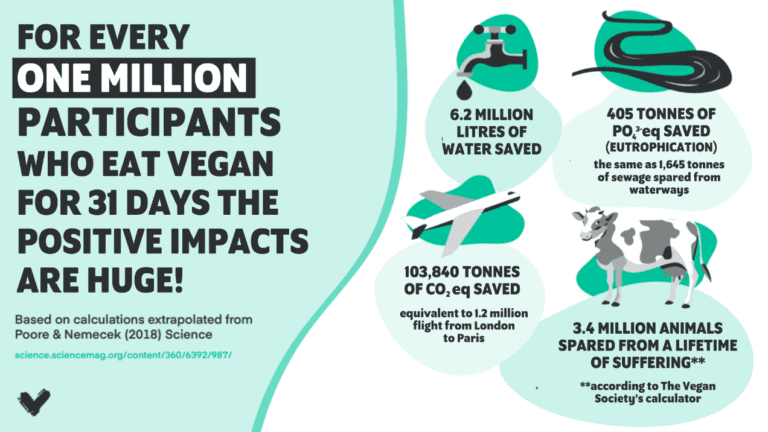
And we had about 25 million people participating this year!
Nidhi: On World Health Day, what message would you like to convey to our readers, for them to join the plant-based revolution led by Veganuary India?
Prashanth: I consider being alive to be a gift. We all have a brief window in time to experience the beauty of the world and contribute towards making it a better place. Eating plant-based helps us to be physically, mentally and emotionally healthy and allows us to use our time here more meaningfully. It helps reduce risks to so many lifestyle disorders, gives you a better chance at hitting your fitness goals, and a clear conscience about doing your part for the environment and the animals. Personally, for me, once I made the shift, a diverse world of foods, friendships, a meaningful career and connection with nature opened up. We all start with some form of conditioning, but we don’t have to be bound by that for a lifetime. We are the land of Ahimsa, and here’s a great opportunity to live our values. Join us, and try vegan. It is a very structured transition, covering all aspects of plant-based eating. Look at it as a course for which you’d have normally paid thousands of rupees, now available for free. We’ll make it so much fun and I promise it will be one of the best decisions of your life!
Photo Credits: Prashanth Vishwanath
